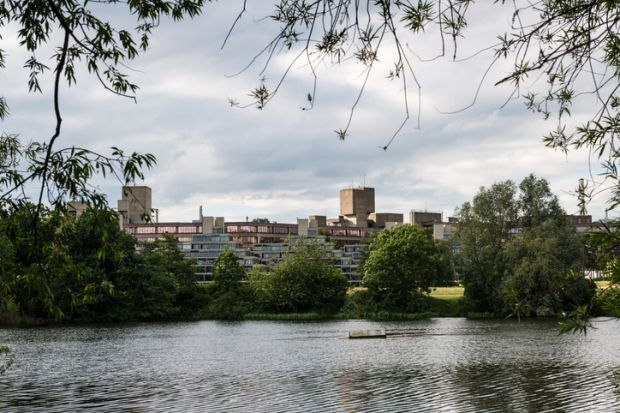Staff at the crisis-hit University of East Anglia will not be given a pay rise in line with much of the rest of the sector as the institution attempts to cut its costs.
The Norwich-based university has announced that it is deferring the pay award recently implemented by the Universities and Colleges Employers Association (Ucea).
Staff will have to wait 11 months to receive the extra money that their peers at other universities are being paid. Under Ucea’s instruction, institutions should have upped pay by 2 per cent or £1,000 – whichever is greater – in March pay packets, backdated to February.
The remainder of the pay rise – worth between 5 per cent and 8 per cent, depending on existing salary level – is due to be paid in August. UEA staff, however, will not receive the first share of the money until January 2024, and the rest will follow in July 2024.
UEA’s council has triggered a clause in the national bargaining process that allows universities with extenuating financial circumstances to defer pay uplifts for up to 11 months.
Christine Bovis-Cnossen, who was appointed acting vice-chancellor upon the sudden departure of David Richardson last month, said it was a “very difficult decision and it is not one we wanted to take”.
“But if it means we can minimise the need for any compulsory redundancies, then it is the right decision to make at this time,” she added.
“We are committed to keeping this under review, and should our financial outlook improve, we would look to implement the pay award sooner.”
Cutbacks at the university were announced in January after a £13.9 million deficit was identified, which was expected to triple in three years. It has since emerged that the current financial health of the institution might be worse than first thought, with the deficit for 2023-24 now expected to be £30 million because it faces a steep repair bill for its 1960s campus and has missed student recruitment targets.
Staff have been warned of redundancies, and have previously said they fear departments could face cuts of between 10 and 25 per cent, although no figures have been officially announced.
Professor Bovis-Cnossen said the university was “not in a position to share any more detail about the further cost-saving proposals at this time but will keep our staff informed. We expect to be able to give more information towards the end of April.
“I want to reiterate that compulsory redundancies are a last resort, and we are exploring all other areas to see where we can make cost savings. We’re working hard to mitigate impacts on our staff and on students.”
The national pay bargaining process was brought forward by three months this year to ensure that staff were given an earlier pay rise to cope with the rising cost of living. Unions had argued that pay should increase in line with inflation (which is currently above 10 per cent), but employers argued that the rise had to be affordable for all institutions, including those struggling financially.
Once initial cost savings have been made, Professor Bovis-Cnossen said, “the focus will soon turn to our operating model and how we are structured to ensure UEA is fit for purpose for our future vision and the years ahead”.
A new vice-chancellor should be in place by the summer, UEA said, and they will serve an interim term of up to 24 months. The process for recruiting a longer-term replacement will start at the beginning of 2024.
UEA council chair Sally Howes added that “while UEA’s financial situation is serious, we have a clear sense of what we need to do to achieve the required cost savings, and I’m confident we can get there together”.
Register to continue
Why register?
- Registration is free and only takes a moment
- Once registered, you can read 3 articles a month
- Sign up for our newsletter
Subscribe
Or subscribe for unlimited access to:
- Unlimited access to news, views, insights & reviews
- Digital editions
- Digital access to THE’s university and college rankings analysis
Already registered or a current subscriber? Login










